Marian Harkin is no novice when it comes to backing rural Ireland. The feisty 66 year-old Sligo woman has represented Ireland North West Midlands for 15 years in the EU parliament and was recently elected as an Independent TD to Dáil Éireann for the Sligo Leitrim constituency.
Right from the start of her work in community development Marian was taunted about wanting a hospital at every crossroads and a Luas from Ballina to Sligo.
“This kind of rubbish was thrown at us as if I and the people around me were stupid. As if we had no insight into what would be good for our region. I think to some extent that prejudice is still there. It’s not that we want everything the same everywhere. That’s impossible but what the regions must do is play to their strengths.
Opportunities
While COVID-19 is anything but a blessing Marian believes changes in how we work post COVID could be a game changer in the development of rural Ireland. She believes the arrival of technological universities will drive this development. Four of the five promised include Dublin – which is up and running – while the southeast, Munster and Connaught Ulster technological universities are well under way.
“These universities will allow many people access quality education in their own regions. They will build on the strengths of the regions and allow entrepreneurs the space to try out new ideas. This is one piece of infrastructure that is both nationwide and regional and can assist in building on the strengths we have and identifying new ones.”
Digital age
“I don’t need to talk about broadband. We are living in the digital age and this must be a priority for Government. E-government, e-commerce are important while digital printing has the potential to revolutionise manufacturing. The impact on how we do things and on our exports will be ground breaking once we have high speed broadband. These changes are a real opportunity to build strong regions. I would love to see this Government stitch this essential infrastructure into how they do their business.
Social services and working
from home
Marian says the experiment with working from home has many attractions but it comes with provisos.
“Take home care packages: most people want to live at home with assistance for as long as they can. This can be done with part family and part outside care mainly provided by women. Women also have childcare issues.
“We need to be careful in this brave new world we are building that women or men don’t bear the brunt of working full time while also taking on most of the caring responsibilities. Or that their willing support is used as an excuse to cut existing supports.
She says people want to see a more comprehensive homecare service which would make financial sense for Government. While services exist, to some extent COVID-19 has exposed the weaknesses of childcare and eldercare.
“These services are needed to underpin a society that is more regional, more local and more focussed on home working.
“Such accessible services support society and must underpin any regional strategy. It’s not enough to talk about rural development. It must be embedded in policy and legislation.”
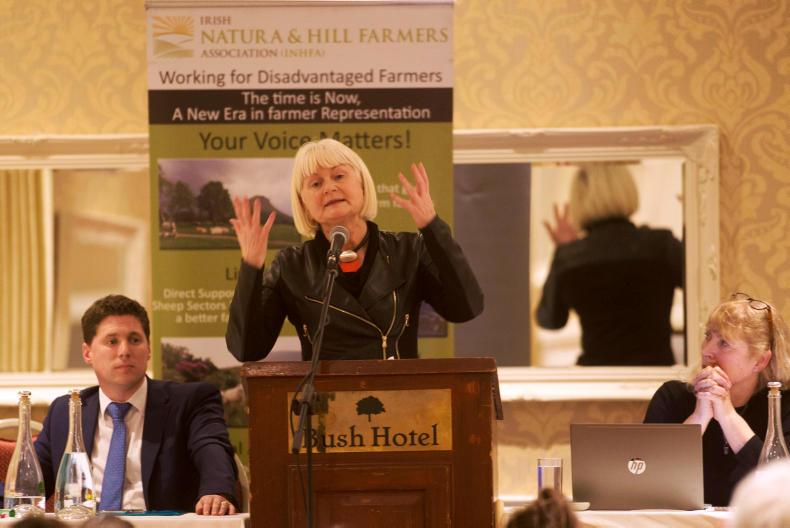
Marian Harkin speaking at an Irish Natura and Hill Farmers Association meeting. \ Brian Farrell
Farming: where to post-COVID19?
Marian says we know enough about the new Common Agricultural Policy (CAP) to know it’s a rebalancing and looking at extensive farming alongside intensive farming. It’s about providing public goods by protecting bio-diversity, looking at the nitrogen cycle, looking at farming processes that produce the minimum of CO2 and methane.
“In the last week I’ve been twice to the bog slide in Drumkeeran. Driving along those country roads, if you take time to look around, you see the lushness of growth and realise this kind of land has a role to play.
“For too long the West of Ireland has been characterised as full of part-time farmers, not really contributing, not up there when it comes to efficiencies. What this CAP will bring is an understanding that yes production and efficiency matters but it’s one of the components, it’s not the be all and end all and farmers will be paid for doing other things because other things matter too.
“Sometimes the pendulum can swing too far in the one direction. I have wanted to tear my hair out when I see how some EU legislation is implemented in Ireland.
“The kind of flexibility that should be there isn’t. We push it as far away as possible and then when we have to do something about it we crucify people in our zeal. The Nitrates Directive and SACs are examples of this.”
COVID-19 winners
The GAA: As if we didn’t know it already COVID-19 taught us how deeply the GAA is woven into the lives of so many people. It harnessed volunteerism and goodwill and people loved doing something useful and practical. It showed the importance of local actions in local areas where results could be seen and the burden was made lighter for everyone.
Post Offices: Post men and women are local and connected and helped sustain many people during the lockdown. They were an anchor for both rural and urban communities. However, Government policy up to now has been a drip, drip of post office closures by stealth. No one sets out to dismantle a service but if preventative action isn’t taken this is what happens.
Rural proofing means nothing if you can’t say precisely what it means in a specific set of circumstances such as the closure of post offices. There are 826 rural post offices in the country and rural proofing means not just having that number in a few years’ time but that we will proactively investigate how to make them sustainable.
What Marian learned from COVID-19
Global events are very disturbing and can lead to people losing their bearings. To fight that we must learn to manage what’s going on in our own lives and connection with your local community helps achieve this.Prior to COVID-19 I would have been guilty of buying things I didn’t need or want. And I know I’m not alone in this. That all stopped during the lockdown when I only bought essentials. When things get back to normal I would like to think I’d retain that discipline and only spend locally.While COVID-19 was good for some people it also exposed the terrible living circumstances of others. Home was anything but a safe place for many. It made me more aware of the impact the pandemic had on people’s physical and mental health. I think COVID-19 gives us a difficult opportunity when we go about rebuilding society and the economy that we stitch in things that make life more tolerable for people at risk. Are Zoom meetings the
way of the future?
“I don’t really know but if they are
viable for businesses then it will happen. I recently took part in a Zoom meeting with 186 people online so the technology is there. But take the EU biodiversity strategy, if farmers are to have a say, this will demand big meetings. Can that be done on Zoom? Or will farmers want public meetings on this strategy?” Marian asks.
Marian Harkin is no novice when it comes to backing rural Ireland. The feisty 66 year-old Sligo woman has represented Ireland North West Midlands for 15 years in the EU parliament and was recently elected as an Independent TD to Dáil Éireann for the Sligo Leitrim constituency.
Right from the start of her work in community development Marian was taunted about wanting a hospital at every crossroads and a Luas from Ballina to Sligo.
“This kind of rubbish was thrown at us as if I and the people around me were stupid. As if we had no insight into what would be good for our region. I think to some extent that prejudice is still there. It’s not that we want everything the same everywhere. That’s impossible but what the regions must do is play to their strengths.
Opportunities
While COVID-19 is anything but a blessing Marian believes changes in how we work post COVID could be a game changer in the development of rural Ireland. She believes the arrival of technological universities will drive this development. Four of the five promised include Dublin – which is up and running – while the southeast, Munster and Connaught Ulster technological universities are well under way.
“These universities will allow many people access quality education in their own regions. They will build on the strengths of the regions and allow entrepreneurs the space to try out new ideas. This is one piece of infrastructure that is both nationwide and regional and can assist in building on the strengths we have and identifying new ones.”
Digital age
“I don’t need to talk about broadband. We are living in the digital age and this must be a priority for Government. E-government, e-commerce are important while digital printing has the potential to revolutionise manufacturing. The impact on how we do things and on our exports will be ground breaking once we have high speed broadband. These changes are a real opportunity to build strong regions. I would love to see this Government stitch this essential infrastructure into how they do their business.
Social services and working
from home
Marian says the experiment with working from home has many attractions but it comes with provisos.
“Take home care packages: most people want to live at home with assistance for as long as they can. This can be done with part family and part outside care mainly provided by women. Women also have childcare issues.
“We need to be careful in this brave new world we are building that women or men don’t bear the brunt of working full time while also taking on most of the caring responsibilities. Or that their willing support is used as an excuse to cut existing supports.
She says people want to see a more comprehensive homecare service which would make financial sense for Government. While services exist, to some extent COVID-19 has exposed the weaknesses of childcare and eldercare.
“These services are needed to underpin a society that is more regional, more local and more focussed on home working.
“Such accessible services support society and must underpin any regional strategy. It’s not enough to talk about rural development. It must be embedded in policy and legislation.”

Marian Harkin speaking at an Irish Natura and Hill Farmers Association meeting. \ Brian Farrell
Farming: where to post-COVID19?
Marian says we know enough about the new Common Agricultural Policy (CAP) to know it’s a rebalancing and looking at extensive farming alongside intensive farming. It’s about providing public goods by protecting bio-diversity, looking at the nitrogen cycle, looking at farming processes that produce the minimum of CO2 and methane.
“In the last week I’ve been twice to the bog slide in Drumkeeran. Driving along those country roads, if you take time to look around, you see the lushness of growth and realise this kind of land has a role to play.
“For too long the West of Ireland has been characterised as full of part-time farmers, not really contributing, not up there when it comes to efficiencies. What this CAP will bring is an understanding that yes production and efficiency matters but it’s one of the components, it’s not the be all and end all and farmers will be paid for doing other things because other things matter too.
“Sometimes the pendulum can swing too far in the one direction. I have wanted to tear my hair out when I see how some EU legislation is implemented in Ireland.
“The kind of flexibility that should be there isn’t. We push it as far away as possible and then when we have to do something about it we crucify people in our zeal. The Nitrates Directive and SACs are examples of this.”
COVID-19 winners
The GAA: As if we didn’t know it already COVID-19 taught us how deeply the GAA is woven into the lives of so many people. It harnessed volunteerism and goodwill and people loved doing something useful and practical. It showed the importance of local actions in local areas where results could be seen and the burden was made lighter for everyone.
Post Offices: Post men and women are local and connected and helped sustain many people during the lockdown. They were an anchor for both rural and urban communities. However, Government policy up to now has been a drip, drip of post office closures by stealth. No one sets out to dismantle a service but if preventative action isn’t taken this is what happens.
Rural proofing means nothing if you can’t say precisely what it means in a specific set of circumstances such as the closure of post offices. There are 826 rural post offices in the country and rural proofing means not just having that number in a few years’ time but that we will proactively investigate how to make them sustainable.
What Marian learned from COVID-19
Global events are very disturbing and can lead to people losing their bearings. To fight that we must learn to manage what’s going on in our own lives and connection with your local community helps achieve this.Prior to COVID-19 I would have been guilty of buying things I didn’t need or want. And I know I’m not alone in this. That all stopped during the lockdown when I only bought essentials. When things get back to normal I would like to think I’d retain that discipline and only spend locally.While COVID-19 was good for some people it also exposed the terrible living circumstances of others. Home was anything but a safe place for many. It made me more aware of the impact the pandemic had on people’s physical and mental health. I think COVID-19 gives us a difficult opportunity when we go about rebuilding society and the economy that we stitch in things that make life more tolerable for people at risk. Are Zoom meetings the
way of the future?
“I don’t really know but if they are
viable for businesses then it will happen. I recently took part in a Zoom meeting with 186 people online so the technology is there. But take the EU biodiversity strategy, if farmers are to have a say, this will demand big meetings. Can that be done on Zoom? Or will farmers want public meetings on this strategy?” Marian asks.





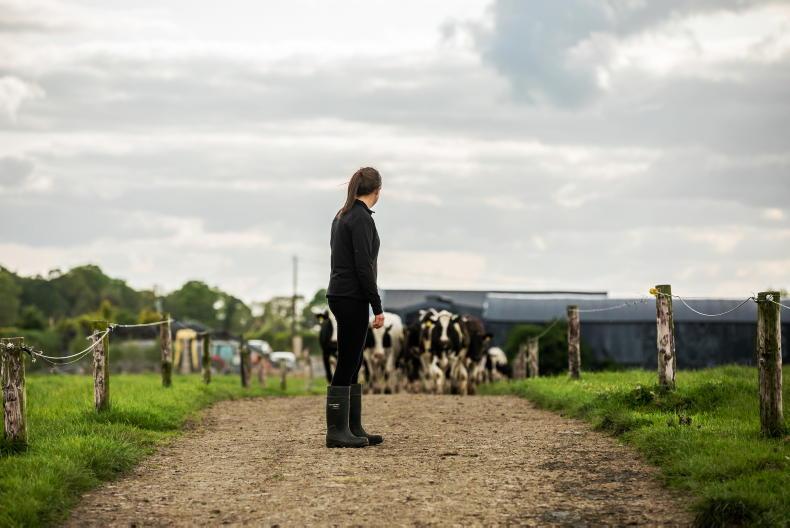
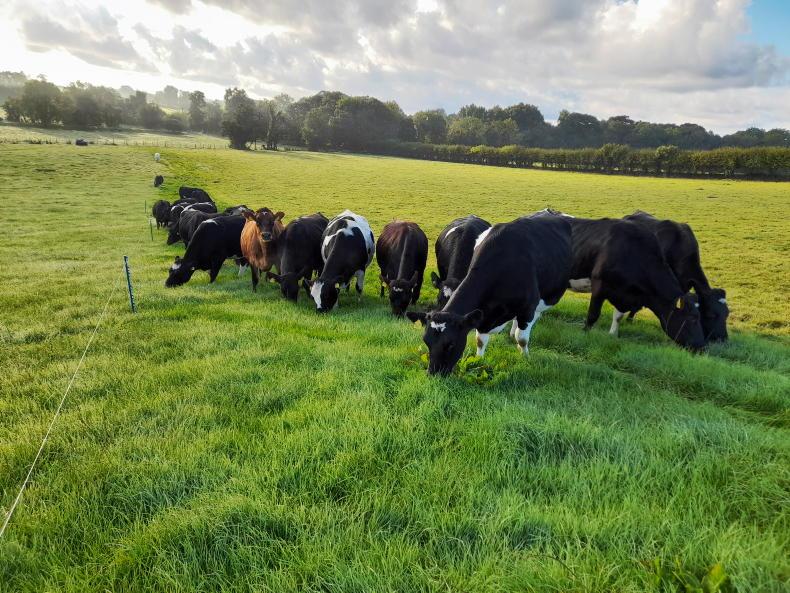
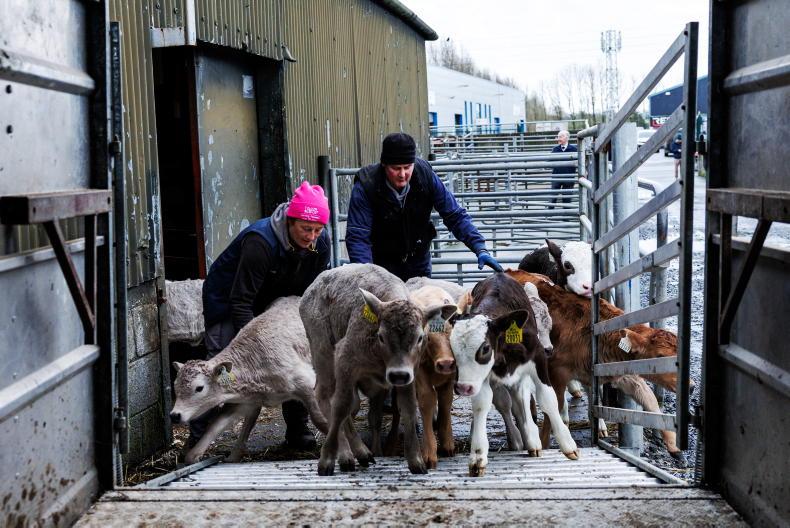
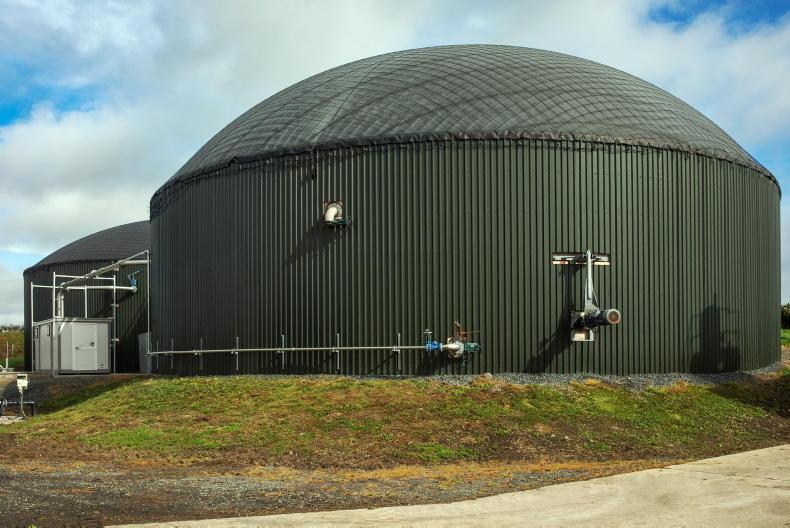
SHARING OPTIONS